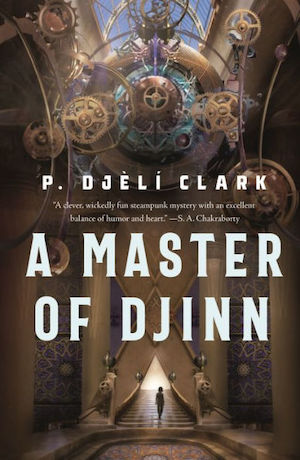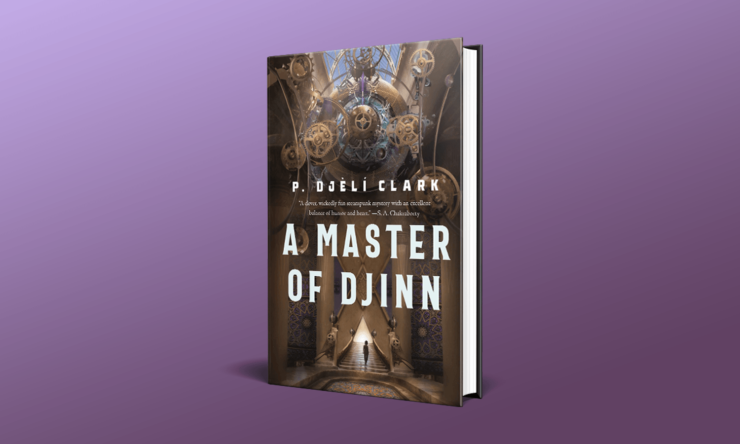P. Djèlí Clark has been one of my auto-buy authors for a few years now, so when I heard he was putting out a full-length novel (finally!), I jumped at the chance to review it. Of all his works, his Dead Djinn series is my favorite. I’m a sucker for urban fantasy mysteries, and especially drawn to those with locales, leads, and legends who aren’t white and Western/European/British. Happily for me, A Master of Djinn did not disappoint.
What began as a short story about Fatma el-Sha’arawi and Siti investigating a mechanical angel attempting to use the Clock of Worlds has now grown into a second short story, a novella, and now a full length novel, A Master of Djinn. Many of the concepts and characters from previous entries have parts to play here, both major and minor, but it functions well enough as a standalone for new readers.
It’s 1912 and Cairo is a hubbub of activity and innovation. Decades ago, a mysterious man known only as al-Jahiz blew a hole open between our world and the magical one. Across the globe, mythical and magical beings appeared. In the US, the reaction was, unsurprisingly, full of spite and hatred. In Egypt, the djinn integrated peacefully into society, bringing art and architecture, as well as military might in driving out Western colonizers.
Now, Egypt is one of the most powerful nations in the world, while Europe and Britain struggle in the wake of technological obsolescence and the loss of their colonies. But Cairo is no grand utopia. Rapid industrial and cultural expansion has left a lot of the population behind, ignored and neglected in slums and shantytowns on the outskirts of the city.
Buy the Book


A Master of Djinn
Fatma is at the top of her game. She’s widely regarded as the best in the business, that business being an agent for the Egyptian Ministry of Alchemy, Enchantments, and Supernatural Entities. When a group of mostly rich white Britons are burned to death in their secret cult headquarters, Fatma is assigned to the case. Much to her chagrin, she is also assigned a partner, Agent Hadia Abdel Hafez, fresh out of the training academy. Hadia is young enough to be easily awed by the magic of the world and eager enough to take big risks in her career. She makes for a nice counterweight to Fatma, who is wiser and more jaded.
The facts of the case don’t add up, and things get even weirder when a black-robed figure riding a giant Ifrit appears all over the city claiming to be the returned al-Jahiz. Violence erupts as the underclass vent their frustrations and the upper class try to negotiate treaties with tetchy European leaders. Oh, and did I mention mechanical beings that may or may not be angels who seem way too interested in the goings on of mortals, a strange curse that affects humans and djinn in different yet awful ways, and Fatma’s badass girlfriend Siti who worships a lion-headed goddess and wields powerful, inexplicable magic?
Clark takes a fascinating premise and extrapolates the reactions and consequences to the rest of the world. Against this inventive alternate history backdrop he sets up a clever crime and even cleverer detective. This is no ordinary murder mystery, and this supposed al-Jahiz is no ordinary mystic. The more questions Fatma and Hadia ask, the more the answers fracture and spiral out of control.
True to form, Clark weaves in nuanced discussions of colonialism, the patriarchy, white feminism, sexism, racism, misogynoir, and blackface, among other issues. I especially appreciated the way he explored the way Westerners utilized racism and Egyptians colorism to denigrate and oppress. Hadia is light-skinned, Siti is dark-skinned, and Fatma is somewhere between. At one point, they interview a wealthy Egyptian woman who tolerates Fatma and Hadia but refuses Siti entry to her home because her skin is so dark; her reactions are rooted in bigotry that dates back centuries.
The African American jazz players who fled Jim Crow for Cairo find it interesting and frustrating that colorism and racism seem to be everywhere, even in Africa, even in the most advanced nation in the world. They also remind the Egyptians that many of those who prize their lighter skin tones would not pass the paper bag test back in the States. What rights and freedoms the Egyptians hold within their own nation would be rendered moot across the pond. Power and privilege are conditional and contextual.
P. Djèlí Clark’s A Master of Djinn builds on the momentum of not just the rest of the series but the Clark canon. It’s his most complex work to date, full of all the wit, imagination, and incisive socio-cultural critique fans have come to expect. At least a third of the pages of my review copy are dogeared, marking important passages and startling lines, interactions, and scenes worth coming back to. I could easily write three times as much as I have now and still only scratch the surface of this outstanding novel. This will be at the top of my To Recommend list for a long time coming.
A Master of Djinn is available from Tordotcom Publishing.
Read an excerpt here.
Alex Brown is a librarian by day, historian by night, author and writer by passion, and a queer Black person all the time. Keep up with them on Twitter, Instagram, and their blog.










